Mexico City, or CDMX as locals call it, is one of the most exciting LGBTQ destinations in the world — a place where culture, history, and inclusivity thrive. As someone living in Mexico and traveling extensively, I’ve fallen in love with the energy of gay Mexico City, from its buzzing nightlife to its world-class museums and diverse neighborhoods.
Whether you’re bar-hopping through gay bars in Mexico City’s Zona Rosa, exploring art-filled streets in Roma and Condesa, or joining one of the city’s legendary Pride events, there’s no shortage of unforgettable experiences here. In this guide, I’ll share 43 gay things to do in Mexico City — including cultural gems, foodie hotspots, and vibrant LGBTQ-friendly spaces — so you can experience gay CDMX like a local.
Table of Contents
ToggleHISTORICAL SITES IN CENTRO HISTORICO
Mexico City’s Centro Histórico is a treasure trove of cultural riches and architectural wonders. As the heart of the city, this area pulses with life, blending Mexico’s rich history with modern-day energy. Whether you’re into ancient ruins, stunning architecture, or street food, there’s something here for everyone.
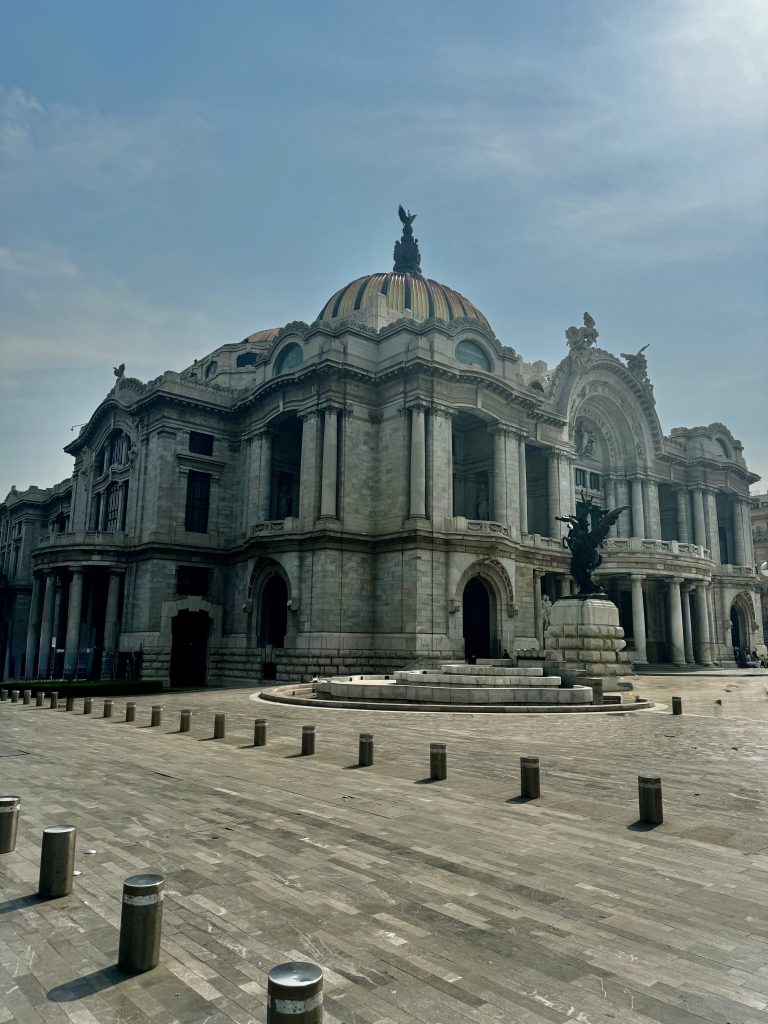
1. Zócalo (Plaza de la Constitución)
The Zócalo is more than just a central square; it’s the beating heart of Mexico City. Surrounded by historic buildings and bustling with activity, this enormous plaza has been the site of countless historical events. Here, you’ll find:
- Daily flag ceremonies with Mexico’s massive national flag
- Local vendors and musicians adding to the lively atmosphere
- Stunning views of the surrounding architectural gems
It’s a perfect spot to start your exploration of Centro Histórico!
2. Metropolitan Cathedral (Catedral Metropolitana)
Right on the Zócalo’s edge stands the Metropolitan Cathedral, an architectural masterpiece blending Baroque, Renaissance, and Neo-Classical styles. It’s one of the largest and oldest cathedrals in the Americas, dating back to the 16th century. Inside, you’ll be captivated by:
- Intricate altarpieces and ornate chapels
- An underground crypt where many archbishops are buried
- The striking bell towers, which offer city views if you’re up for a climb
3. Templo Mayor and Museum
A stone’s throw from the Cathedral, the Templo Mayor is a must-see for history enthusiasts. These ancient Aztec ruins offer a glimpse into the pre-Hispanic past of Tenochtitlan, the Aztec city that Mexico City was built upon. In the Templo Mayor Museum, you’ll find:
- Fascinating artifacts uncovered from the site
- The massive Stone of Tlaltecuhtli, an Aztec deity
- Interactive exhibits that bring Aztec culture to life
4. Palacio Nacional (National Palace)
Home to Mexico’s federal government, the Palacio Nacional is a place of great historical and artistic significance. But for visitors, the real draw is the Diego Rivera murals that adorn its walls. Rivera’s “The Epic of the Mexican People” vividly tells Mexico’s history, and you’ll also see:
- Stunning courtyards and colonial architecture
- The office of Mexico’s president
- Occasional free guided tours for an in-depth look
5. Torre Latinoamericana
Want panoramic views of Mexico City? Head up the Torre Latinoamericana, one of the city’s tallest buildings. This skyscraper has withstood multiple earthquakes, and at the observation deck, you’ll be rewarded with:
- A 360-degree view of Mexico City
- Access to a small museum detailing the tower’s history
- A café where you can enjoy a coffee with a view
6. Palacio de Bellas Artes
One of the city’s most iconic buildings, the Palacio de Bellas Artes is a true feast for the eyes, both inside and out. Known for its Art Nouveau and Art Deco styles, it’s a cultural hub where you can catch performances or just admire its beauty. Inside, you’ll find:
- The impressive Tiffany glass curtain depicting volcanoes
- Murals by famed artists like Diego Rivera and David Siqueiros
- Regular performances, including the Ballet Folklórico de México
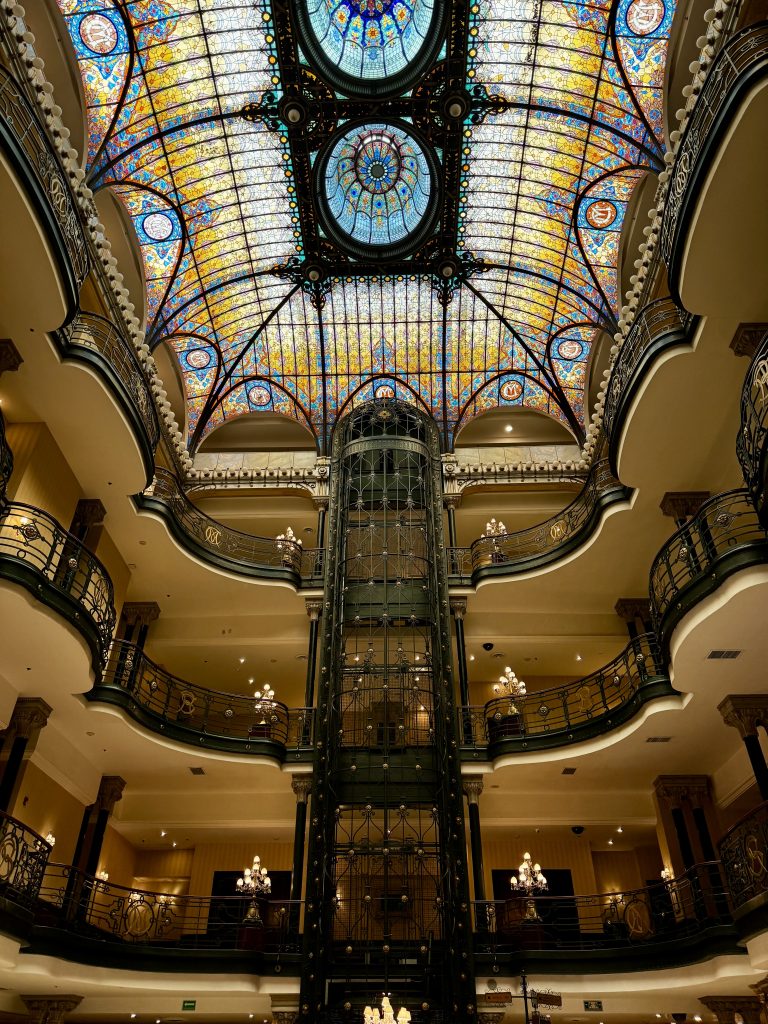
7. Alameda Central
Right next to the Palacio de Bellas Artes is Alameda Central, a lush park perfect for a relaxing stroll. Established in the 16th century, it’s one of the oldest public parks in the Americas. Here, you can enjoy:
- Monuments and statues commemorating Mexican history
- Shady paths, fountains, and green spaces to unwind
- Street vendors selling everything from snacks to handmade crafts
8. Museo Franz Mayer
For art and design enthusiasts, the Museo Franz Mayer is a hidden gem. Located near Alameda Central, this museum holds an extensive collection of decorative arts, from ceramics to furniture, many of which date back to the colonial period. Highlights include:
- Regular rotating exhibitions featuring contemporary artists
- An impressive ceramics collection showcasing Mexican craftsmanship
- A peaceful courtyard café where you can sip coffee surrounded by greenery
9. Mercado de la Ciudadela
If you’re looking for authentic Mexican handicrafts, the Mercado de la Ciudadela is the place to be. This vibrant market is packed with stalls selling everything from textiles to pottery. Browsing here is like stepping into a colorful dream:
- Handmade souvenirs like embroidered blouses, wooden toys, and woven baskets
- Local artisans showcasing traditional Mexican craftsmanship
- The chance to haggle for the best price on unique items
10. Casa de los Azulejos (House of Tiles)
The Casa de los Azulejos is a visual delight with its iconic blue and white tile facade. This historic building dates back to the 18th century and now houses a Sanborns restaurant, but even if you’re not there to eat, it’s worth a visit just to marvel at:
- The intricate Talavera tiles covering the exterior walls
- The elegant staircase and murals inside
11. The Gran Hotel Ciudad de Mexico
The Gran Hotel Ciudad de México, located in the heart of Mexico City’s historic center, is a stunning example of Art Nouveau architecture and timeless luxury. This iconic hotel is famous for its breathtaking Tiffany stained-glass ceiling.
12. Museo de Arte Popular
The Museo de Arte Popular in Mexico City is a vibrant celebration of Mexican folk art and culture, nestled in the historic heart of the city. Housed in a beautifully restored Art Deco building, the museum showcases a diverse collection of handcrafted pieces. See:
- Intricate textiles and indigenous costumes
- Whimsical alebrijes (brightly colored fantastical creatures)
- Rotating exhibits of crafts
ENJOY LEAFY COYOCAN
In the south of the city is Coyoacan, a picturesque neighborhood in Mexico City, offers visitors a rich blend of history, art, and culture. Known for its cobblestone streets, vibrant markets, and as the former home of famed artist Frida Kahlo, Coyoacan feels like a step back in time. Whether you’re an art enthusiast, a history buff, or just someone who loves exploring, Coyoacan has something for everyone. In this article, we’ll explore six must-do activities in Coyoacan to help you make the most of your visit.
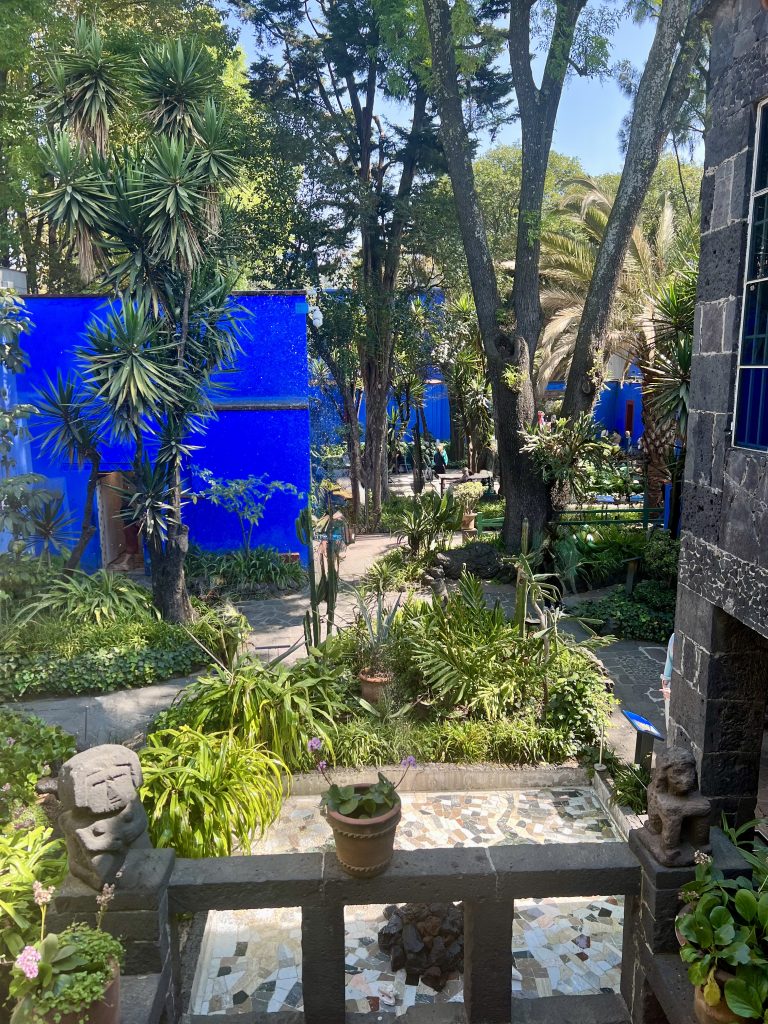
13. Visit the Frida Kahlo Museum (La Casa Azul)
One of Coyoacan’s biggest draws, the Frida Kahlo Museum—often called “La Casa Azul” due to its iconic blue walls—is a must-visit for art and history lovers. This was Frida Kahlo’s childhood home and later the place where she lived with fellow artist Diego Rivera.
Inside, you’ll find an intimate glimpse into Kahlo’s life, including her artwork, personal belongings, and even some of her clothing. The museum does a fantastic job of showcasing her unique style and how her life experiences shaped her art. It’s a deeply moving experience that gives insight into her world beyond the canvas.
Tips for visiting:
- Book tickets online in advance since the museum can get crowded
- Take time to explore the garden—it’s a peaceful spot full of lush plants, sculptures, and small fountains.
- Photography is allowed in certain areas but often requires an additional fee.
14. Wander Through the Coyoacan Market
A trip to Coyoacan isn’t complete without wandering through the local market. The Mercado de Coyoacan is a lively, colorful space where you can find a little bit of everything: fresh produce, Mexican street food, handmade crafts, and souvenirs.
Food lovers should try some of the local delicacies here. Tacos de canasta (basket tacos) and churros are popular street foods that are perfect for snacking while you browse. For the more adventurous, try a chapulín taco—yes, that’s a taco filled with fried grasshoppers!
15. Stroll Around Jardin Centenario and Plaza Hidalgo
In the heart of Coyoacan, you’ll find two of its most beloved public spaces: Jardin Centenario and Plaza Hidalgo. These squares are perfect for people-watching, relaxing, and soaking in the local atmosphere. Look for the famous Coyote Fountain in Jardin Centenario, symbolizing the “place of coyotes,” which is the meaning of “Coyoacan” in Nahuatl.
Street performers, local artists, and vendors often gather here, creating a lively, festive atmosphere. This area is also surrounded by cafes, restaurants, and small shops, making it easy to grab a coffee or snack while you explore.
16. Explore the Leon Trotsky Museum
For history buffs, the Leon Trotsky Museum is a fascinating place to visit. After being exiled from the Soviet Union, revolutionary leader Leon Trotsky settled in Coyoacan, where he spent the last years of his life. The house has been preserved almost exactly as it was when he lived there, complete with bullet holes from an assassination attempt.
This museum offers a unique perspective on 20th-century political history and provides insight into the life of Trotsky. It’s not as well-known as the Frida Kahlo Museum, making it a quieter but equally intriguing stop in Coyoacan.
Highlights of the museum:
- Trotsky’s personal library and artifacts, which reflect his intellectual pursuits and interests.
- The garden and his tomb, where Trotsky is buried along with his wife.
- Historical exhibits about his life, philosophy, and impact on global politics.
17. Anahuacalli Museum
The Anahuacalli Museum is a unique and striking cultural landmark in Coyoacan, built by the legendary Mexican artist Diego Rivera to house his extensive collection of pre-Hispanic artifacts. Wonder at:
- Rivera’s pre-Colombian art collection
- Extensive murals painted throughout the museum
- The amazing temple like building
18. Mammoth Murals at UNAM
Closeby to Coyocan, The murals at UNAM (Universidad Nacional Autónoma de México) are a vibrant celebration of Mexican culture, history, and identity, created by some of Mexico’s most renowned artists, including Diego Rivera, David Alfaro Siqueiros, and Juan O’Gorman.
SPEND THE AFTERNOON IN CHAPULTEPEC PARK
Chapultepec Park (Bosque de Chapultepec), often called the “lungs of Mexico City,” is one of the largest and most beautiful urban parks in the world. Spanning over 1,600 acres, this green oasis offers a refreshing break from the hustle and bustle of the city. The park is packed with things to see and do, from exploring historic sites and museums to relaxing by scenic lakes. Here are six must-do activities to experience the best of Chapultepec Park.
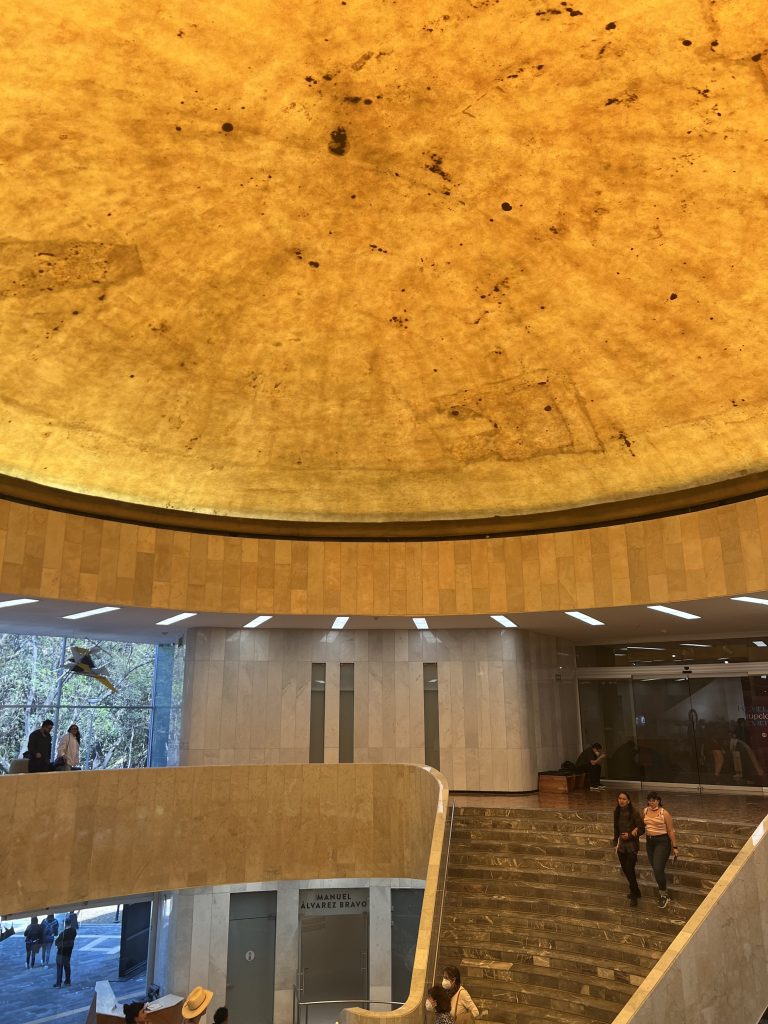
19. Visit Chapultepec Castle
Perched atop Chapultepec Hill, Chapultepec Castle is a majestic historic site and the only royal castle in North America. Built in the late 18th century, the castle has served many purposes over the years, from an imperial residence to a military academy. Today, it houses the National Museum of History, showcasing artifacts from Mexico’s past, including relics from the Mexican-American War and items belonging to Emperor Maximilian I and Empress Carlota.
The castle also offers breathtaking panoramic views of Mexico City, making it a photographer’s dream. As you wander through its grand rooms, gardens, and terraces, you’ll be transported back in time, experiencing both Mexican history and the elegance of 19th-century architecture.
Pro Tip: Arrive early in the morning to avoid crowds and enjoy the serene views from the top of Chapultepec Hill.
20. Explore the National Museum of Anthropology
The National Museum of Anthropology (Museo Nacional de Antropología) is one of Mexico’s most important museums and a must-visit for anyone interested in the country’s rich heritage. Home to an extensive collection of pre-Columbian artifacts, the museum showcases the history and culture of Mexico’s indigenous civilizations, including the Aztec, Maya, and Olmec.
One of the museum’s highlights is the Aztec Sun Stone (often mistakenly called the “Aztec Calendar”), a massive, intricately carved stone that reflects Aztec cosmology. Other fascinating exhibits include Mayan artifacts, ancient sculptures, and a life-size replica of a traditional Mayan tomb. The museum’s immersive displays offer an unparalleled look into Mexico’s ancient cultures, making it a top spot for history buffs and curious travelers alike.
Must-See Exhibits:
- Aztec Sun Stone
- Replica of Moctezuma’s headdress
- The colossal Olmec heads
21. Admire Contemporary Art at the Museum of Modern Art
Art enthusiasts should make a beeline for the Museo de Arte Moderno (Museum of Modern Art) within Chapultepec Park. This museum boasts an impressive collection of 20th-century Mexican art, featuring iconic works from artists like Frida Kahlo, Diego Rivera, Rufino Tamayo, and José Clemente Orozco. One of the museum’s most famous pieces is Kahlo’s “Las dos Fridas” (“The Two Fridas”), a deeply personal painting that reflects her inner struggles and identity.
The museum also has rotating exhibitions that showcase contemporary artists from around the world, as well as an outdoor sculpture garden where you can wander and admire large-scale installations. For art lovers, the Museum of Modern Art is a fascinating exploration of both Mexican and international art trends.
Highlights to Look For:
- Frida Kahlo’s “Las dos Fridas”
- Diego Rivera’s lesser-known works
- The tranquil outdoor sculpture garden
22. Visit Museo Tamayo
The Museo Tamayo is a contemporary art museum located in Chapultepec Park. Named after Mexican artist Rufino Tamayo, the museum showcases modern and contemporary art from around the world. It’s a quiet, less touristy spot that’s ideal for a contemplative afternoon.
The museum frequently hosts temporary exhibitions that highlight both Mexican and international LGBTQ+ artists, adding a unique touch to your visit. After exploring the galleries, relax at the museum’s café, which offers a serene view of the surrounding park.
23. Casa & Studio of Luis Barrgan
Near Chapultepec park, The Casa & Studio of Luis Barragán in Mexico City is a masterpiece of modern architecture, blending minimalism with vivid color and thoughtful spatial design. Built in 1948, this UNESCO World Heritage site embodies Barragán’s philosophy of creating spaces that evoke peace, solitude, and inspiration.
EXPLORE BOHEMIAN CONDESA
La Condesa, nestled in the heart of Mexico City, is one of the city’s most vibrant and picturesque neighborhoods. Known for its tree-lined streets, art deco architecture, and bohemian atmosphere, La Condesa has something for everyone—from lush green parks and bustling markets to chic cafes and nightlife hotspots. Whether you’re a foodie, a history buff, or a lover of the arts,
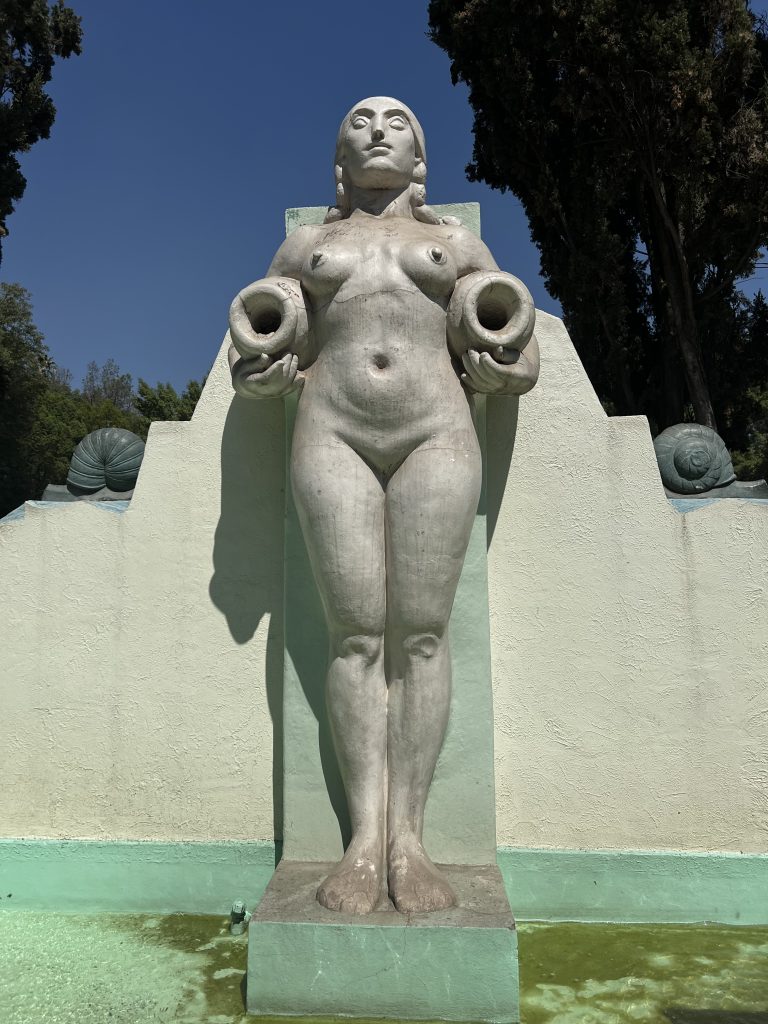
24. Stroll Through Parque México
One of the first things you’ll notice about La Condesa is its beautiful green spaces, and Parque México is undoubtedly the crown jewel. This lush park, dotted with fountains, art installations, and winding paths, is a peaceful oasis in the middle of the city. Grab a coffee, take a leisurely stroll, or join the locals for yoga and dog walking. The art deco touches and towering trees make it a top spot for photos.
Tip: Check out the small amphitheater, where you might catch a live performance or street artists showcasing their talent.
25. Get Your Sugar Fix
Across from Parque Mexico, visit El Moro Churreria. Churros with dips created from different types of chocolate are their specialty. Let Moro opened its first location in 1935.
26. Wander Around Parque España
Just a short walk from Parque México, you’ll find Parque España—a smaller but equally charming green space. Known for its ponds, playgrounds, and sculptures, Parque España has a more relaxed vibe and is perfect for picnics or people-watching. The park is surrounded by cafes and restaurants, so you can grab a snack and enjoy it on a bench while soaking up the local atmosphere.
Did You Know? This park was created to celebrate the friendship between Mexico and Spain, and you’ll find various Spanish cultural references throughout.
27. Indulge in Café Culture
La Condesa is brimming with cafes, each with its own unique vibe. From sleek, modern coffee spots to cozy, retro hangouts, the neighborhood offers something for every coffee lover. Visit Blend Station or Lalo! for a trendy atmosphere, or Ojo de Agua if you’re looking for fresh juices and a healthy brunch. Take some time to sip on a latte, people-watch, or catch up on reading.
Local Favorite: Café Toscano has been a neighborhood staple for years, serving up strong coffee and delicious pastries in a rustic, welcoming setting.
28. Explore Art Deco Architecture
Architecture enthusiasts will be in heaven in La Condesa. This neighborhood is known for its well-preserved art deco buildings, a rare sight in bustling Mexico City. Walk down Avenida Amsterdam, where you’ll see stunning facades, intricate balconies, and charming details from the 1920s and 1930s. The roundabout layout of the streets gives it a unique European feel, perfect for a self-guided walking tour.
Pro Tip: Many of the buildings on Avenida Ámsterdam were designed by notable Mexican architects, so take your time admiring the intricate details.
29. Visit Galería OMR
For art lovers, a trip to Galería OMR is a must. Located in La Condesa, this contemporary art gallery showcases cutting-edge works by Mexican and international artists. From installations and sculptures to paintings and photography, Galería OMR gives you a taste of Mexico City’s thriving art scene. The exhibitions change regularly, so there’s always something new to explore.
Insider Tip: Entrance is free, making it a budget-friendly way to enjoy some local culture and creativity.
30. Discover the Sunday Bazaar in Plaza Popocatépetl
Every Sunday, Plaza Popocatépetl hosts a charming bazaar featuring local artisans, vintage vendors, and food stands. From handcrafted jewelry and ceramics to secondhand books and vinyl records, this market is the perfect place to pick up unique souvenirs. The lively atmosphere and friendly vendors make it a fun way to spend a Sunday morning in La Condesa.
TACOS, COCKTAILS & MERCADOS
Mexico City offers an unforgettable experience for food and cocktail enthusiasts alike, with a vibrant culinary scene that captures the heart and soul of Mexican flavors. From craft cocktails and world-class tacos to a gourmet food market, there’s something for every taste in this dynamic city.
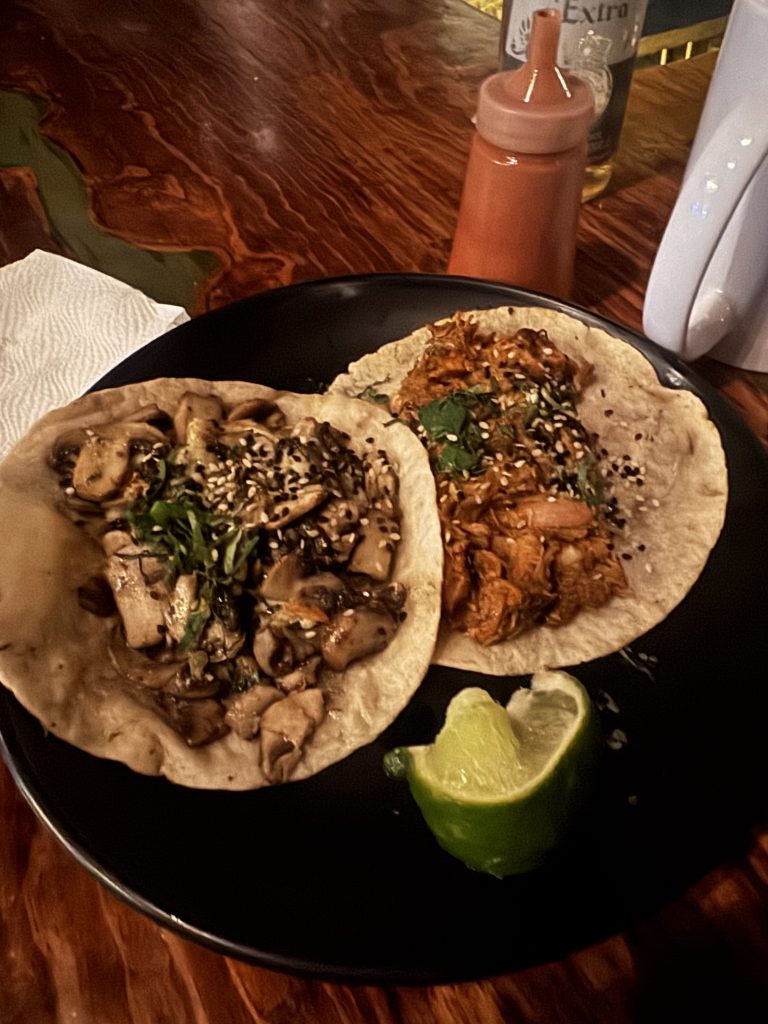
31. Check out Mexico City’s Amazing Craft Cocktail Scene
Mexico City (CDMX) is a treasure trove of eclectic bars, each with its own unique vibe and style. From hidden speakeasies and mystical mezcalerías to rooftop bars with breathtaking views, the CDMX nightlife has something for everyone. Here are five bars too check out. Several have recently been named in the 50 Best Bars in the World.
- Limantour (Roma Norte) – Signature Drink “Margarita al Pastor”
- Hanky Panky (Juárez) – Reservations are essential due to limited seating
- Tlecan (Roma Norte) – Try their Mezcal tastings
- Brujas (Roma Norte) – Try “Cihuacoatl” inspired by the Aztec goddess of motherhood and fertility
- Baltra Bar (Condesa) – a crowd favorite is the “Gin Basil Smash”
32. Eat the Best Tacos in Mexico City
There’s no place quite like Mexico City when it comes to tacos. From the bustling street stands to upscale taquerías, CDMX offers a seemingly endless array of taco choices, each one more delicious than the last. Whether you’re craving classic al pastor, juicy carnitas, or something more unique, Mexico City has a taco for every taste.
- El Huequito – For the Ultimate Tacos al Pastor (Condesa, Centro)
- Taquería Orinoco – Northern Mexico Meets CDMX (Zona Rosa, Roma Norte)
- Los Cocuyos – Late-Night Street Taco Heaven (Centro)
- El Califa – Upscale Taquería with a Modern Twist (Roma Norte)
- Las Costillas de San Luis – For Epic Beef Ribs Tacos (Roma Norte)
- Tacos de Canasta El Abuelo – The Famous “Basket Tacos” (Roma Norte)
33. Check out Mercado Roma
Mercado Roma is a great dinner stop when you’re with a group that’s hard to please. With dozens of restaurant (and bar) stalls, you can find something for every picky eater in the group. Want to try grasshoppers? In the mood for a charcuterie board? Want a great burger or pizza? You’re in the right place. This dining hall is not like many other markets in the city–it’s generally more expensive, but with written menus, it’s a good choice for diners with food sensitivities.
34. Take a food tour
One way to experience the Mexico City street food scene is to take a food tour with Club Tengo Hambre. Besides tacos, experience many different varieties of Mexican cuisine.
EXPLORE GAY HISTORY & CULTURE
Mexico City (CDMX) is one of the most LGBT-friendly cities in Latin America, welcoming locals and visitors with open arms and a rich array of diverse experiences. From iconic neighborhoods and inclusive bars to cultural landmarks and pride-filled events, the LGBT scene in CDMX is lively, colorful, and constantly evolving. Whether you’re here to experience the history, dive into the nightlife, or simply connect with like-minded people, Mexico City has something for everyone.
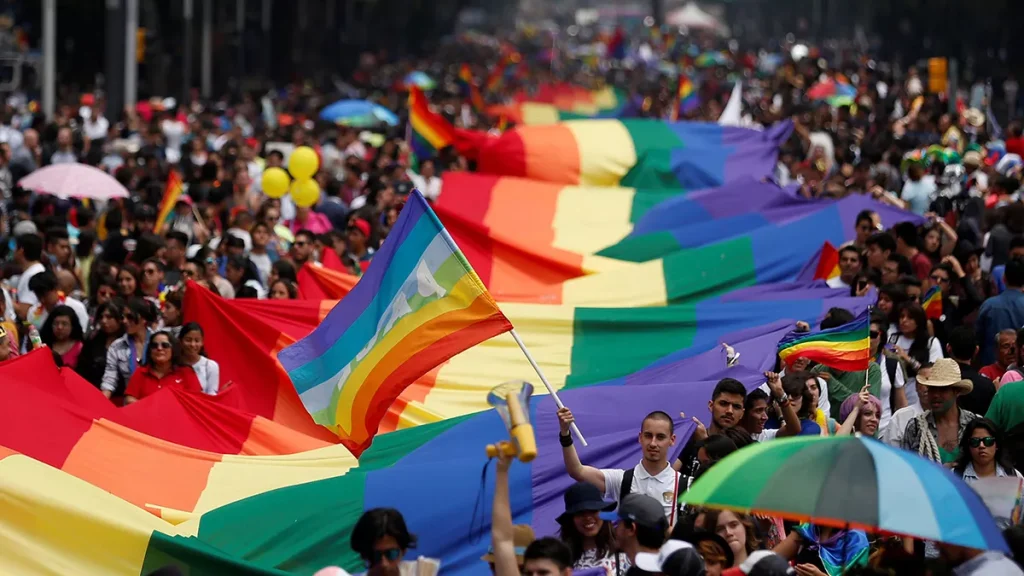
35. Zona Rosa – The Heart of LGBT Culture in CDMX
If there’s one place every gay traveler should visit in Mexico City, it’s Zona Rosa (the “Pink Zone”). Located in the Juárez neighborhood, Zona Rosa is the historic center of LGBT life in CDMX, packed with bars, clubs, cafes, and shops that cater to the community. Zona Rosa has been the heart of Mexico City’s gay scene since the 1980s and continues to be the most popular gathering spot.
Some must-visit spots within Zona Rosa include La Purísima, a lively gay club known for its energetic dance floors and inclusive atmosphere, and Kinky Bar, a multi-level bar and club featuring drag shows, rooftop views, and an always-vibrant crowd.
Insider Tip: Head to Amberes Street, where most of the popular LGBT bars and clubs are located, making it easy to hop from one spot to another!
36. Plaza de la Solidaridad and the Rainbow Crosswalks
In 2016, Mexico City installed Latin America’s first permanent rainbow crosswalks, a colorful landmark in front of Plaza de la Solidaridad. This area symbolizes Mexico City’s commitment to inclusivity and support for the LGBT community. You’ll find the rainbow crosswalks near the Alameda Central Park, right by the Juárez metro station.
Plaza de la Solidaridad itself is a small but historic square, with nearby monuments and the Alameda Central park to explore. It’s a popular spot for LGBT activism events and gatherings, especially around Pride Month in June. While you’re there, take a photo on the rainbow crosswalks and enjoy the lively energy of the area.
Must-Do: Snap a photo on the rainbow crosswalk and then take a stroll through Alameda Central Park, one of the city’s oldest parks with beautiful gardens and fountains.
37. Museo del Chopo – A Hub for Alternative Culture
Museo Universitario del Chopo is a museum that celebrates alternative and counter-culture movements, making it a key spot for LGBT art and expression in Mexico City. Located in the Santa María la Ribera neighborhood, this museum often hosts exhibitions, film screenings, and events that explore themes of gender, sexuality, and diversity.
The architecture alone is worth a visit—the museum is housed in a striking iron structure originally built in Germany in the early 20th century. Known for its support of marginalized voices, Museo del Chopo is a place where you’ll find experimental art, edgy performances, and provocative installations that celebrate individuality and self-expression.
Insider Tip: Check their schedule for events; they frequently host LGBT-focused exhibits and film festivals, especially around Pride Month.
38. Cineteca Nacional – Queer Film Screenings
Cineteca Nacional is an inclusive space that attracts a diverse crowd, and its focus on alternative and experimental cinema makes it a go-to spot for exploring LGBT stories on the big screen. Attending a queer film screening here is a great way to see Mexico’s take on LGBT cinema, from documentaries to indie films that tackle issues of identity and love.
39. Take a Gay Walking Tour
Several local guides offer LGBTQ+ focused tours that highlight Mexico City’s queer history, including stops in historic LGBTQ+ neighborhoods and notable landmarks. Saul at Divercitours provides a great walking tour tailored to your needs.
40. Attend Mexico City Pride (Marcha del Orgullo)
If you’re visiting in June, don’t miss Mexico City’s Pride Parade, known as Marcha del Orgullo. This annual event is one of the largest in Latin America and brings together thousands of people to celebrate LGBTQ+ rights and diversity.
The parade usually starts at the Ángel de la Independencia and ends at the Zócalo. Expect colorful floats, energetic music, and a vibrant atmosphere that showcases Mexico City’s inclusivity and progressive spirit.
41. Best Places for a Gay Night Out in Mexico City
Mexico City (CDMX) is one of the most gay-friendly destinations in Latin America, boasting an eclectic and vibrant nightlife scene that draws locals and travelers alike. Whether you’re looking to dance the night away, enjoy live drag performances, or sip cocktails in a stylish bar, Mexico City has a range of venues that cater to the gay community. Ready for a night to remember? Here are the top places for a gay night out in Mexico City!
- La Purísima – Zona Rosa
- Kinky Bar – Zona Rosa
- Tom’s Leather Bar – Condesa
- Baby – Juárez
- El Almacén – Zona Rosa
SHOP FOR MEXICAN DESIGN
42. Mexican Designers
Mexico City’s fashion scene is booming, with local designers creating everything from edgy streetwear to refined, sustainable pieces. If you’re a man looking to add some unique Mexican designer pieces to your wardrobe, CDMX offers plenty of spots that combine traditional craftsmanship with modern style.
- Goodbye Folk (Roma Norte) – known for its retro, rock-and-roll vibe and one-of-a-kind pieces.
- Maison Manila (Juarez) – Must-Buy Item: A tailored blazer by a top Mexican designer, perfect for adding a touch of class to your wardrobe.
- 180º Shop (Roma Norte) – A go-to for men’s streetwear and avant-garde Mexican fashion.
- Ikal (Polanco) – offers a modern take on Mexican fashion with a focus on sustainable and locally-produced pieces.
- Amor & Rosas (Roma Norte) – known for its focus on socially-responsible fashion, working with artisans across Mexico to incorporate traditional techniques into modern designs.
VISIT THE PYRAMIDS
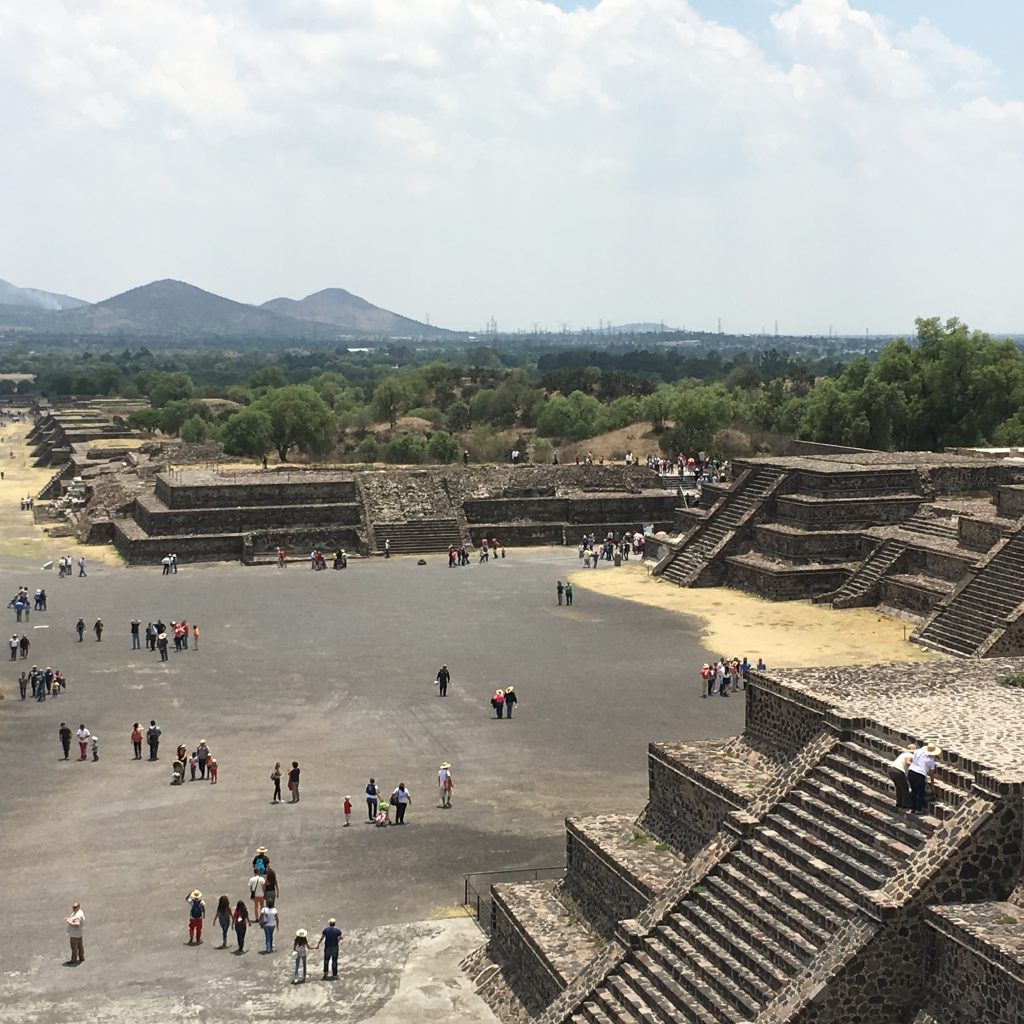
43. Day Trip to Teotihuacan
Just an hour’s drive from Mexico City lies Teotihuacan, an ancient city that’s home to some of the most impressive pyramids in the Americas. Known as the “City of the Gods,” Teotihuacan was once a thriving Mesoamerican metropolis, believed to have been built around 100 AD. Today, visitors can walk in the footsteps of ancient civilizations, climbing the iconic Pyramid of the Sun and the Pyramid of the Moon, both of which offer breathtaking panoramic views of the surrounding landscape. The Avenue of the Dead, a wide boulevard connecting these massive structures, is lined with smaller temples and intriguing ruins that paint a vivid picture of life in this ancient city. This UNESCO World Heritage site is not only a testament to human ingenuity and artistry but also a fascinating dive into Mexico’s rich pre-Hispanic history.
A visit to Teotihuacan is best experienced in the early morning, when the crowds are smaller and the sunrise casts a golden glow over the pyramids. Many visitors also enjoy a hot air balloon ride at dawn, offering a unique aerial view of the site and a chance to see the ancient city from a whole new perspective. Make sure to bring comfortable shoes, sun protection, and plenty of water, as the site is expansive and you’ll be doing a lot of walking. Don’t miss the chance to stop by the on-site museum, where artifacts like pottery, jewelry, and murals provide deeper insights into the lives of Teotihuacan’s original inhabitants. Whether you’re a history enthusiast or just looking for an unforgettable adventure, visiting the pyramids near Mexico City is an awe-inspiring experience that will leave you with lasting memories.
GAY-FRIENDLY PLACES TO STAY
Hotel Condesa DF, located in the heart of Condesa, blends Parisian chic with Mexican contemporary design. Known for its unique architectural style and laid-back mood, it’s the perfect spot for gay travelers seeking a stylish and inclusive stay.
Neighborhood: Condesa
Highlights:
- Rooftop bar with city views
- On-site restaurant offering international cuisine
- Yoga classes and wellness services available
- Mood: Chic, artsy, and laid-back
Cost: $$$$
Guests love the eclectic decor and the sense of privacy at Condesa DF. Located right in one of the most gay-friendly neighborhoods, it’s easy to explore local bars, restaurants, and parks nearby.
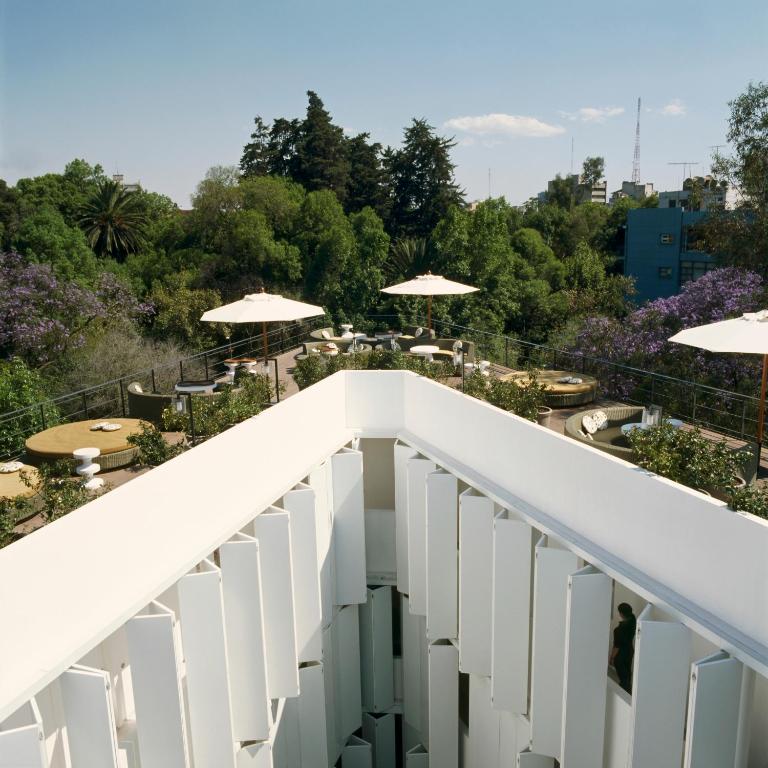
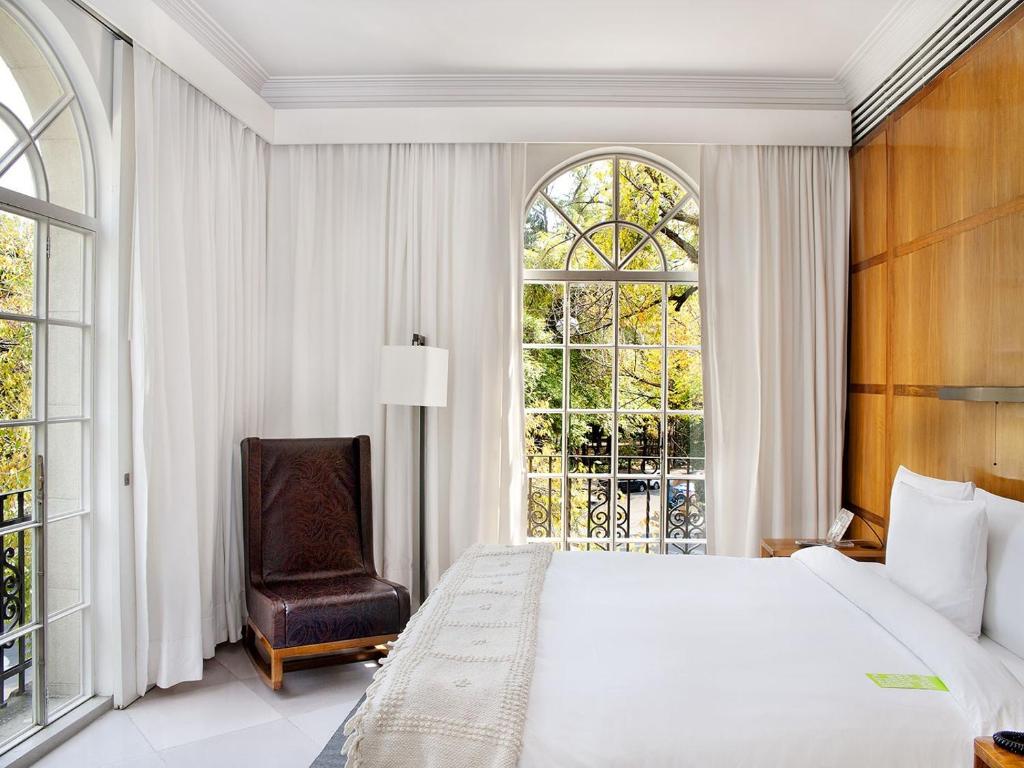
Located near the lush Parque Mexico, the Hippodrome Hotel offers an upscale, boutique experience with a contemporary design. This hotel is known for its sleek interiors, comfortable amenities, and personalized service, making it a great choice for gay travelers who want both style and comfort. The hotel’s commitment to inclusivity and its proximity to gay-friendly spots make it an ideal stay for travelers exploring Condesa.
Highlights:
- Luxurious rooms with chic, minimalist decor
- Located next to Parque Mexico, perfect for morning jogs or leisurely strolls
- High-quality on-site dining at Bonito PopFood
Mood: Modern, stylish, and intimate
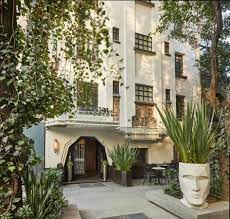
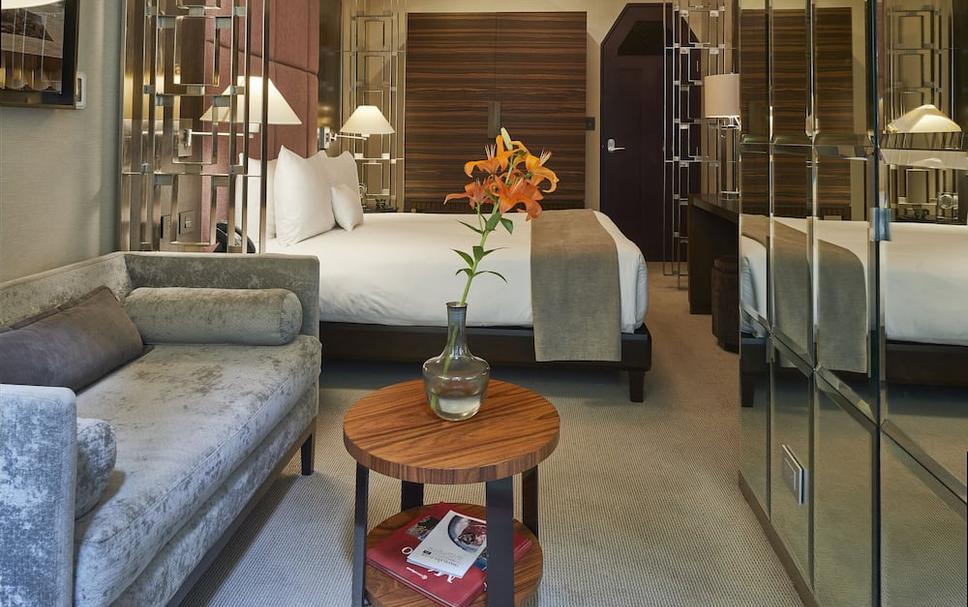
📍Budget: HOTEL STANZA
Hotel Stanza offers an affordable yet stylish option in the heart of Roma Norte. The hotel’s modern decor and friendly staff make it a popular choice for travelers on a budget who still want to enjoy the area’s lively scene.
Neighborhood: Roma Norte
Highlights:
- On-site restaurant with Mexican and international dishes
- Walking distance to gay-friendly bars and clubs
- 24-hour gym for fitness enthusiasts
- Mood: Modern, affordable, and lively
Cost: $
The convenient location makes it easy for guests to explore Roma Norte’s nightlife, art, and culture. Stanza is a great value for those wanting to enjoy Mexico City’s gay-friendly atmosphere.
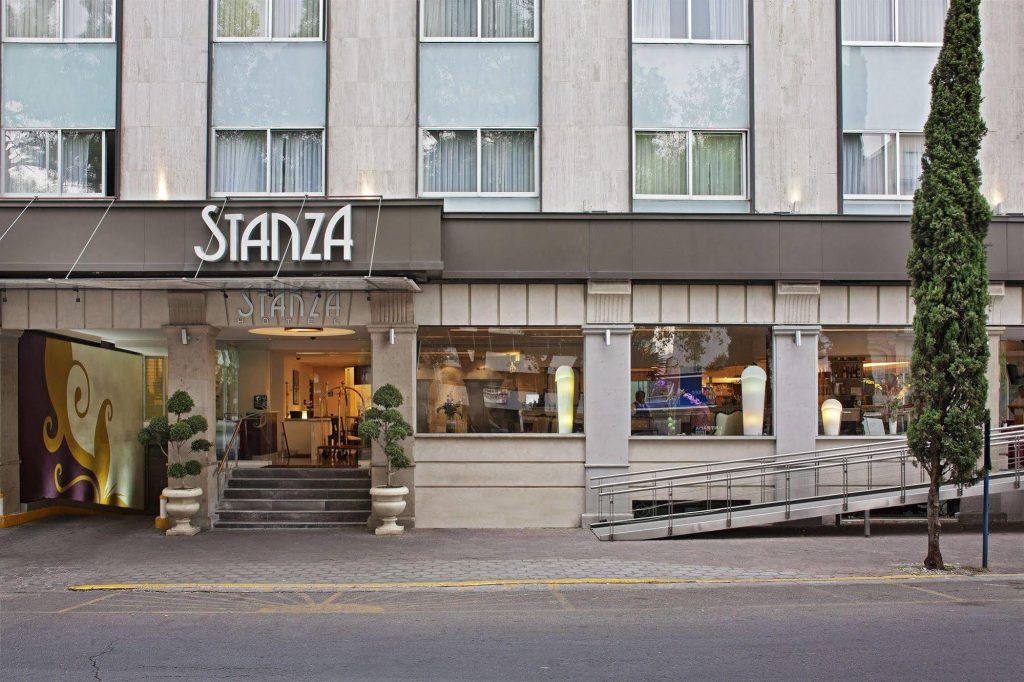
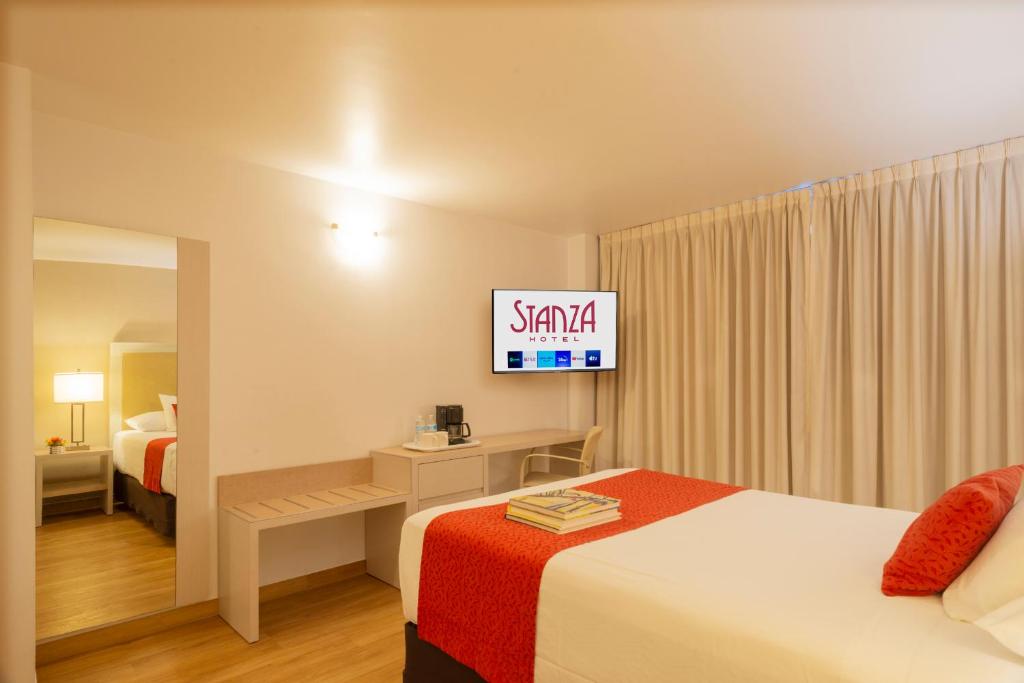
FAQS
Is Mexico City gay friendly?
Absolutely! Mexico City, or CDMX, is one of the most gay-friendly cities in Latin America. It has a vibrant gay scene, especially in neighborhoods like Zona Rosa and Condesa, where you’ll find inclusive bars, clubs, and cafes. The city celebrates LGBTQ+ culture with events like the annual Pride Parade, which is one of the largest in Latin America.
What are the best neighborhoods for gay travelers in Mexico City?
The top neighborhoods for gay travelers include Zona Rosa, known as the heart of the gay scene, and Condesa, which offers a bohemian vibe with gay-friendly cafes and bars. Roma Norte and Juárez also have an inclusive atmosphere, with plenty of cultural and nightlife spots to explore.
When is Mexico City Pride, and what can I expect?
Mexico City Pride, known as Marcha del Orgullo, typically takes place in June. The parade usually starts at the Ángel de la Independencia and ends at the Zócalo. Expect colorful floats, live music, and a lively, inclusive atmosphere that celebrates LGBTQ+ rights and diversity.
Are there specific LGBTQ+ tours available in Mexico City?
Yes, several local guides offer LGBTQ+ focused tours that dive into Mexico City’s queer history, notable LGBTQ+ landmarks, and inclusive neighborhoods. Tours like Divercitours provide tailored experiences that highlight CDMX’s rich LGBTQ+ heritage.
What is Zona Rosa, and why is it important for gay visitors?
Zona Rosa, located in the Juárez neighborhood, is the historic center of LGBTQ+ life in Mexico City. It’s packed with gay-friendly bars, clubs, cafes, and shops. For decades, Zona Rosa has been the go-to place for the LGBTQ+ community, offering a safe, welcoming environment for locals and travelers alike.
Can I find gay-friendly accommodations in Mexico City?
Yes, many hotels and hostels in Mexico City are gay-friendly, particularly in areas like Zona Rosa, Condesa, and Roma Norte. Major hotel chains are generally inclusive, and you’ll also find LGBTQ+ owned or focused accommodations in these neighborhoods.
What cultural sites should gay travelers visit in Mexico City?
Some must-visit cultural sites include the Museo del Chopo, known for its exhibitions on alternative and counter-culture movements, and Cineteca Nacional, which often screens LGBTQ+ films. The Frida Kahlo Museum is also popular for its celebration of Frida’s life and her complex relationships, making it a meaningful stop for gay visitors.
Is Mexico City safe for gay travelers?
Mexico City is generally safe for gay travelers, especially in well-known, inclusive neighborhoods like Zona Rosa, Condesa, and Roma. However, as with any big city, it’s important to stay aware of your surroundings and practice common travel safety measures, particularly at night.
What are the best spots for gay nightlife in Mexico City?
Top spots include La Purísima, a lively gay club in Zona Rosa, Kinky Bar with its rooftop views and drag shows, and Tom’s Leather Bar for a more alternative vibe. Mexico City’s gay nightlife is diverse, offering everything from dance clubs to intimate cocktail bars.
Can gay travelers visit the historic and cultural sites around Mexico City without any issues?
Yes, gay travelers can freely visit historic and cultural sites in Mexico City, including places like the Zócalo, Chapultepec Castle, and the National Museum of Anthropology. The city’s inclusive atmosphere ensures that everyone can enjoy its rich cultural offerings comfortably.
Are there any gay events in Mexico City besides Pride?
In addition to the Pride Parade in June, Mexico City hosts various gay events throughout the year. The Museo del Chopo often has LGBTQ+ themed exhibitions, and Cineteca Nacional screens queer films regularly. The city also has LGBTQ+ art exhibits, film festivals, and drag shows happening at different venues across town.
What’s the best way to get around Mexico City as a tourist?
Mexico City has an extensive public transportation system, including metro, buses, and ride-hailing apps like Uber, which is widely used and convenient. Many neighborhoods, especially those with LGBTQ+ hotspots like Condesa and Zona Rosa, are very walkable, making it easy to explore on foot.
IN CONCLUSION
Mexico City is an incredibly diverse and vibrant destination, especially for gay travelers. From the colorful streets of Zona Rosa to the historic architecture in Centro Histórico, there’s something here for everyone. This guide to 42 must-do experiences offers a taste of CDMX’s rich culture, inclusive atmosphere, and endless entertainment options. Whether you’re exploring ancient pyramids, indulging in world-class tacos, or dancing the night away at a trendy gay bar, Mexico City welcomes everyone with open arms and endless possibilities.
As one of the most progressive and gay-friendly cities in Latin America, Mexico City promises an unforgettable adventure filled with history, flavor, and fun. So, pack your bags, bring your curiosity, and get ready to fall in love with a city that celebrates diversity at every turn. Safe travels, and ¡bienvenidos a CDMX!
About the Author
Tim is a seasoned travel writer and the creator of Out in Mexico, a dedicated resource for gay travelers exploring Mexico’s vibrant destinations. After relocating to Guadalajara, he has spent years immersing himself in Mexico’s gay culture, from the iconic beaches of Puerto Vallarta to the nightlife of Mexico City.
With firsthand experience in Mexico’s gay scene, Tim has personally visited the bars, hotels, and events featured in this guide. His insights have helped gay travelers plan unforgettable trips while ensuring they feel safe, welcomed, and informed.
When he’s not writing, you’ll find him sipping a mezcal cocktail at a bar in Guadalajara or travel to a new exciting destination in Mexico.
📍 Follow his adventures: @i.am.out.in.mexico
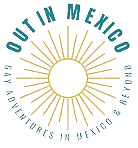

3 replies on “Gay Mexico City: Top Things to Do, See & Explore”
[…] 43 THINGS TO DO IN MEXICO CITY […]
[…] 43 THINGS TO DO IN MEXICO CITY […]
[…] 43 THINGS TO DO IN MEXICO CITY […]